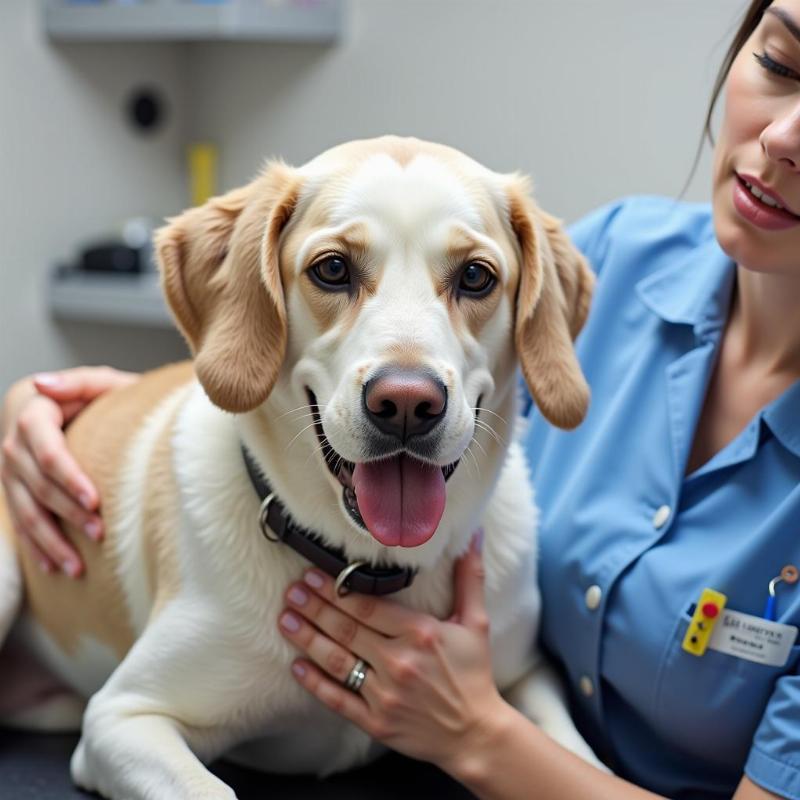If your senior dog has suddenly started pooping in the house, it can be frustrating and concerning. This change in behavior isn’t just an inconvenience; it often signals an underlying medical or behavioral issue. Understanding why your old dog keeps pooping in the house is the first step towards resolving the problem and ensuring your furry friend’s comfort and well-being. This article explores the common causes of indoor accidents in older dogs, offers solutions, and provides practical advice tailored to the American pet-owning experience.
Why is My Senior Dog Suddenly Pooping Inside?
Several factors can contribute to house soiling in older dogs. Unlike puppies who are still learning, senior dogs often regress due to age-related changes. These changes can range from cognitive decline and medical conditions to anxiety and environmental factors. Identifying the root cause is crucial for effective intervention.
Medical Reasons for House Soiling
One of the most common culprits is a medical condition. Conditions like arthritis, canine cognitive dysfunction (similar to dementia in humans), diabetes, inflammatory bowel disease, and kidney disease can all contribute to fecal incontinence or an increased urgency to defecate.
 Senior dog having a vet checkup
Senior dog having a vet checkup
Behavioral Causes of House Soiling
Beyond medical issues, behavioral factors can also play a role. Anxiety, stress, changes in routine, or even new additions to the household can disrupt a senior dog’s established habits and lead to accidents.
Cognitive Decline and House Soiling
Cognitive decline, also known as canine cognitive dysfunction (CCD), affects many senior dogs. Similar to Alzheimer’s in humans, CCD can cause confusion, disorientation, and a loss of learned behaviors, including house training.
How to Address House Soiling in Older Dogs
Addressing house soiling requires a multi-faceted approach. Start by consulting with your veterinarian to rule out any underlying medical conditions. A thorough checkup is essential for determining the best course of action.
Veterinary Examination and Diagnosis
Your veterinarian will likely perform a physical exam, blood tests, and possibly fecal analysis to identify any medical issues. Based on the diagnosis, they may recommend medications, dietary changes, or other treatments.
Behavioral Modification Techniques
If no medical cause is found, behavioral modification techniques may be helpful. These can include creating a consistent routine, reinforcing house training, providing more frequent potty breaks, and using positive reinforcement.
why does my dog keep pooping on my bed
Managing Cognitive Decline
For dogs with cognitive decline, managing the symptoms is key. Maintaining a consistent routine, providing mental stimulation through puzzles and games, and using pheromone diffusers can help alleviate anxiety and confusion.
how to repel dogs from my yard
Practical Tips for Helping Your Senior Dog
-
Establish a consistent potty break schedule: Take your dog out frequently, especially first thing in the morning, after meals, and before bedtime.
-
Confine your dog to a smaller area: This can help prevent accidents and make it easier to monitor their behavior.
-
Clean up accidents thoroughly: Use an enzymatic cleaner to eliminate odors and discourage repeat offenses.
-
Be patient and understanding: It takes time and consistency to address house soiling issues in senior dogs.
Conclusion
Dealing with an older dog pooping in the house can be challenging, but with patience, understanding, and the right approach, you can help your furry friend regain control and maintain a comfortable, clean home environment. Remember to consult with your veterinarian for proper diagnosis and guidance. A combination of medical treatment, behavioral modification, and environmental adjustments can significantly improve your senior dog’s quality of life and strengthen your bond.
FAQ
- My old dog keeps pooping in the house at night. What should I do? Try taking your dog out for a final potty break right before bedtime and limiting their access to water in the evening.
- How can I tell if my dog’s house soiling is due to a medical problem? Look for other symptoms like increased thirst, changes in appetite, lethargy, or discomfort. Consult your veterinarian for a proper diagnosis.
- Are there any medications that can help with fecal incontinence in dogs? Yes, your veterinarian may prescribe medications to help regulate bowel movements.
- What is the best way to clean up dog poop in the house? Use an enzymatic cleaner specifically designed for pet messes to eliminate odors and prevent re-soiling.
- Can anxiety cause a senior dog to poop in the house? Yes, anxiety and stress can disrupt a dog’s normal bowel habits.
- Is it normal for older dogs to have accidents? While aging can bring challenges, house soiling isn’t inevitable. It’s always best to consult a veterinarian to rule out any underlying medical conditions.
- How can I make my house more accessible for my senior dog with mobility issues? Consider using ramps, elevated food and water bowls, and orthopedic bedding.
Beautdogs.us is your premier online resource for all things dog-related in the US. We offer expert advice on dog breeds, care, and products. Whether you’re a seasoned dog owner or just starting your journey, Beautdogs.us is here to provide you with reliable, comprehensive, and engaging information. Contact us for expert advice at [email protected] or call us at +1 501-555-7529.